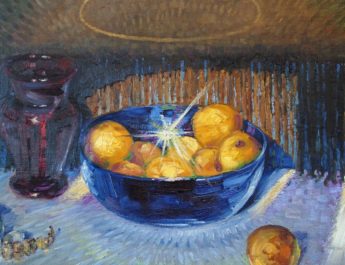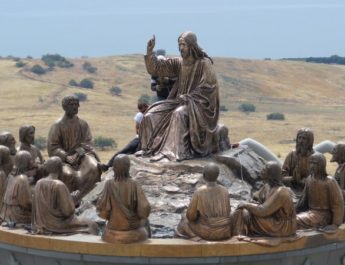Luke 11:11-13
Narrative Lectionary 346
11 Is there anyone among you who,A if your childB asksC for a fish,D
A Literally “now which of you who is a father.”
B “child” = huios. This is son, descendant – a son whether natural born or adopted. It can be used figuratively for other forms of kinship.
C “asks” = aiteo. This is to ask, demand, beg, desire.
D “fish” = ichthus. This means fish. It was also an early, secret Christian symbol – the “sign of the fish.” It was short for “Jesus Christ, Son of God, Savior” in Greek. Seehttps://en.wikipedia.org/wiki/Ichthys
will giveE a snakeF instead of a fish? 12 Or if the child asks for an egg, will give a scorpion?G
E “give” = epididomi. 9x in NT. From epi (on, upon, against, what is fitting) + didomi (give, offer, place, bestow, deliver; give in a literal or figurative sense). This is to deliver, give over, give up, surrender.
F “snake” = ophis. 14x in NT. Perhaps from optanomai (to be seen, to gaze at something with eyes wide open, to see something remarkable). This is snake or serpent, often used of the devil. It is the snake as a type that is sly or cunning – someone malicious.
G “scorpion” = skorpios. 5x in NT. Perhaps from skerpo (to pierce); from skopos (a mark or goal like the marker at the end of a race; figuratively, other goals or destinations; also, a watch or sentry); from skeptomai (to peer out, consider, gaze carefully). This is scorpion – from the root as regards its sting.
13 If you then, who areH evil,I knowJ how to giveK goodL giftsM to your children,N
H “are” = huparcho. From hupo (by, under, about, subordinate to) + archo (to rule, begin, have first rank or have political power). This is to begin or be ready, to exist or possess. It is what one already has or possesses.
I “evil” = poneros. From poneo (to toil); related to ponos (pain, trouble, labor, distress, suffering; toil, which implies anguish); from the base of penes (a laborer, poor person, starving or indigent person; someone who works for their living); from pernomai (working for a living; laborer, poor person; to work for daily bread); from peno (to toil to survive day by day). This is bad, evil, wicked, malicious, grievous, or toilsome. Properly, it is something that bears pain – it emphasizes the miseries and pains that come with evil. By contrast, the Greek kakos refers to evil as part of someone’s core character. Also contrasting the Greek sapros, which deals with falling away from a previously embodied virtue. This word can mean ill, diseased, morally culpable, derelict, vicious, malicious, or guilt. It can also refer to the devil or sinners.
J “know” = eido. This is to know, consider perceive, appreciate, behold, or remember. It means seeing with one’s eyes, but also figuratively, it means perceiving – seeing that becomes understanding. So, by implication, this means knowing or being aware.
K “give” = didomi. Related to “give” in v11 & “gifts” in v13. See note E above.
L “good” = agathos. This is good, a benefit, or a good thing. It is good by its very nature, intrinsically good. A different word, kalos, refers to external signs of goodness.
M “gifts” = doma. Related to “give” in v11. 4x in NT. From didomi (see note E above). This is a gift or present.
N “children” = teknon. From tikto (to beget, bring forth, produce). This is a child, descendant, or inhabitant.
how much moreO will the heavenlyP Father give the HolyQ SpiritR to those who ask him!”
O “more” = mallon. This is rather, more than, or better.
P “heavenly” = ouranos. May be related to oros (mountain, hill) with the notion of height. This is the air, the sky, the atmosphere, and heaven. It is the sky that is visible and the spiritual heaven where God dwells. Heaven implies happiness, power, and eternity.
Q “Holy” = Hagios. From hagnos (holy, sacred, pure ethically, ritually, or ceremonially; prepared for worship, chaste, unadulterated, pure to the core; undefiled by sin; figurative for innocent, modest, perfect). God is totally different from humanity and thus set apart. That which is consecrated to worship God (elements of worship) or to serve God (as the saints) are holy because they are now set apart for God’s purposes. Holy because important to God. This is sacred physically, pure. It can be morally blameless or ceremonially consecrated.
R “Spirit” = Pneuma. From pneo (to blow, breath, breathe hard). This is wind, breath, or ghost. A breeze or a blast or air, a breath. Figuratively used for a spirit, the human soul or part of us that is rational. It is also used supernaturally for angels, demons, God, and the Holy Spirit. This is where pneumonia comes from.
Image credit: “Hawaiian Mother and Child” by Charles W. Bartlett, circa 1920.




